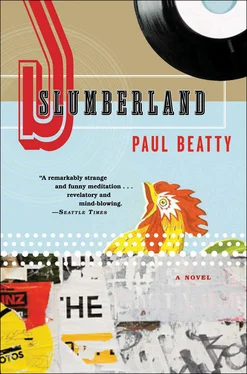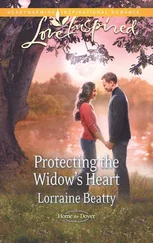I handed her change for the hundred. She fanned open the bills, then jammed the mélange of greenish-yellow fives, purply-blue tens, and one blue-green twenty and olive-brown fifty into an empty water glass and slid the ersatz flower arrangement between the dinner candles.
The restaurant kept spinning. A sharply dressed trio of West German carpetbaggers circled the observation deck and stopped within spitting distance of me to point out their next land grab. Not knowing whom of us was nonradioactive chaff and who was pure uranium-235, I waited for the café’s centrifugal force to put some distance between us. I hate people with more money than me, which means I hate mostly everybody. The shortest speculator leaned rudely over our table. He said the green expanse out in the distance was the Pankow district. Speaking of amortization rates and marble staircases, his language was a patois of German banking terms and Beverly Hills real estate jargon. As he appraised the distant luxury villas occupied, according to him, by members of a soon-to-be-defunct politburo, his oversized tie fluttered off his potbelly and swung in front of my face like a Hermès pendulum. Without thinking, I reached out to touch it. I’d never felt anything so soft. It was a softness that made me question if I had made the right choices in life. I pressed the end of the tie against my cheek. The silk danced down the side of my face; its threads teasingly tangoed with my chin stubble, then freed themselves with mocking pops and haughty static crackles. Feeling the sexual tension, fat boy snatched his tie away and tucked it behind his belt buckle. He raised his hand to his forehead and made a motion as if he were turning the dial to a combination safe, the German sign for crazy. Ashamed of myself, I scooted away from the aisle and leaned against the window. The restaurant kept spinning. The carpetbaggers were hurled on their way, muttering about occupancy rates and the inevitability of the European Union. Outside the window Berlin, a panorama of stratified steel and concrete urbanity, drifted past. It was one of those Bash-o, frog-jumping-into-the-pond, timeless-haiku, apple-on-the-head-theory-of-gravity Newtonian moments. But my mind, corporate-tax-return blank, could only spell epiphany. E-p-i-p-h-a-n-y .
The restaurant kept spinning. Klaudia flipped open her pocket-sized German-English dictionary. Her plucked eyebrows were cinched so tightly they formed the McDonald’s arches above the bridge of her nose. I doubted she was looking up epiphany . I don’t think I’d said it aloud. Apparently she had something to say to me and was searching for exactly the right words. I couldn’t imagine what those words were. And I wasn’t about to try.
The restaurant kept spinning. Klaudia slammed shut her little green Wörterbuch . She’d found the words she’d been looking for. Her thin lips opened. Revealing a sexy gap in her teeth the size of a Little League strike zone. The restaurant kept spinning. What could she possibly have to say to me?
“Ferguson, I think I fall a little bit in love with you.”
I looked past her and, touching Klaudia’s cheek through the glass partition like a pathetic prison lifer, was the sinking Berlin sun. Her fingertip traced the edges of my lips. These Germans, they either want to fuck you or kill you. Sometimes both.
The twilight was uniquely uninspiring. The sun looked wobbly and slumped toward the horizon like a carsick child sinking deeper and deeper into the backseat. Its last act of consciousness, this solar hurl of refracted light, the colors of which were so putrid they scattered the birds and the clouds, and left the moon to clean up the mess.
GERMANY CHANGED. After the Wall fell it reminded me of the Reconstruction period of American history, complete with scalawags, carpetbaggers, lynch mobs, and the woefully lynched. The country had every manifestation of the post-1865 Union save Negro senators and decent peanut butter. Turn on the television and there’d be minstrel shows — tuxedoed Schauspieler in blackface acting out Showboat and literally whistling Dixie. There were the requisite whining editorials warning the public that assimilation was a dream, that the inherently lazy and shiftless East Germans would never be productive citizens. There were East Germans passing for West Germans. Hiding their accents and fashion sense behind a faux-Bavarian stoicism and glacier hat, and making sure that whenever someone said the words Helmut Kohl they responded with “that fat bastard.” It wasn’t even unusual to see Confederate flags stickered to car bumpers and flying proudly from car antennas. The stars and bars were a racist’s surrogate for the illegal swastika, though if you confronted somebody about it they’d claim it represented an appreciation of rockabilly music, especially that of Carl Perkins.
My adoptive fatherland was still an introspective country, but it was a new era; instead of gazing at its navel, the country stared at its big, historical, hairy balls. There was a real sense of joy and accomplishment. This time we were going to do things right. I say “we” because for a moment there I was starting to feel German. Though you never hear of a black person “going native” (that shameful fall from grace is reserved for whites), I had gone, if not native, then at least temporarily Teutonic for one special day. If you can find any footage of the inaugural love parade, that’s me in the ten-inch platform sneakers drinking peach schnapps, sporting a blown-out pink afro and only a pair of black leather chaps, showing my glossy black ass and leading my band of wild white aboriginals down the Ku’damm like a sunburned Kurtz in a parallel universe.
Like Conrad’s Belgian Congo, Germany in the early days of reunification was a land where light was dark and dark was darker. In tribute to this confusing state of flux I’d gotten into the habit of opening up my gigs with the Undertones hit “Teenage Kicks.” The band had broken up seemingly at the height of its success, and in the trades I had once read a quote from Feargal Sharkey, the lead singer: “The last couple of years in the Undertones, for all of us, was very difficult. The conversations generally tried to revolve around, Can you turn that up a bit, or Can you turn that down a bit?” That statement summed up exactly how I felt about the world at that time. And my world was the new Germany — same as it ever was. The vast uninhabited no-man’s-land was reforested into a rich-man’s-land concrete tract of apartment complexes, shopping centers, and office buildings. Actors who when the Wall fell had begged and pleaded to play beleaguered Jews in small-scale indie films now longed to play misunderstood Nazis in big-budget features. If you stopped in a Munich train station and asked the mean-looking woman at the information desk how to get to the Dachau Concentration Camp, she’d snarl, “It’s not a camp, it’s a memorial !” The government legislated spelling-reform laws in a covert attempt to institute a uniform thought process. The country that spells together stays together, and it’s no coincidence that as the ß disappeared, social welfare and a few unlucky people of color also vanished.
Initially, Doris and Lars were elated about the fall of the Wall. Their daytime excursions into East Berlin were like traveling to see an extended family of stepsisters and — brothers who had been sired by the same philandering father. They marveled at the bullet-ridden buildings, the ghastly mullet haircuts. Cherished their first sips of the famed Radeberger beer they had heard so much about. But just as the relationship with “Daddy’s other kids” begins to tire over yet another you-look-just-like-Uncle-Steve conversation, Doris and Lars’s affinity for their poor relations to the east began to sour. They began to view the East Germans, or Ossies, as fundamentally different from themselves. Lazy, unmotivated, and ungrateful. Every day they had a new joke about their backward countrymen:
Читать дальше












